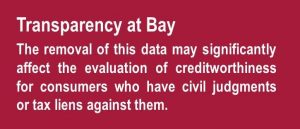 Beginning July 1, 2017, the three largest nationwide credit reporting agencies, Experian, Equifax and Transunion, will delete certain civil judgment and lien information from the databases they use to create credit reports?
Beginning July 1, 2017, the three largest nationwide credit reporting agencies, Experian, Equifax and Transunion, will delete certain civil judgment and lien information from the databases they use to create credit reports?
On July 1, 2017, these credit reporting agencies will begin to implement new enhanced public records standards and related requirements as a result of an enforced settlement agreement between the credit reporting agencies and more than 30 state Attorneys General. These changes will significantly affect the ability to evaluate creditworthiness based on the information obtained solely from these credit reports.
In 2015, Experian, Equifax and Transunion announced the National Consumer Assistance Plan as an initiative to improve the accuracy of credit reporting information and provide a better consumer experience when dealing with these credit reporting agencies. To meet the requirements of this plan, the credit reporting agencies will only accept and report civil judgment and tax lien data from counties which provide the (1) name, (2) address and (3) either date of birth or social security number in association with the judgments and liens. Currently, most data being submitted to these credit reporting agencies do not include a date of birth or social security number and, therefore, will be removed from the credit reports. In fact, preliminary analysis has shown that Transunion will be removing all civil judgment public records data and will be removing 60% of tax lien public data from its databases. Experian, in its preliminary analysis, has shown that approximately 96% of civil  judgment public records data will be removed and as much as 50% of tax lien data will be removed.
judgment public records data will be removed and as much as 50% of tax lien data will be removed.
The removal of this data may significantly affect the evaluation of creditworthiness for consumers who have civil judgments or tax liens against them.
Indeed, judgment and lien information may be some of the most important factors in evaluating credit because they constitute affirmative determinations that money is owed from the debtor to another creditor. By excluding this information from credit reports, a consumer’s credit score may appear much higher than it otherwise should be. While these credit reporting agencies are excluding this data from credit reports, judgment and lien information is available via other sources. Unfortunately, most of these sources require a subscription to utilize their searching capability. If you suspect that a judgment or lien is not included in a credit report, we suggest that you contact your attorney to conduct a more thorough search to help evaluate creditworthiness.
Source: JDSUPRA






















